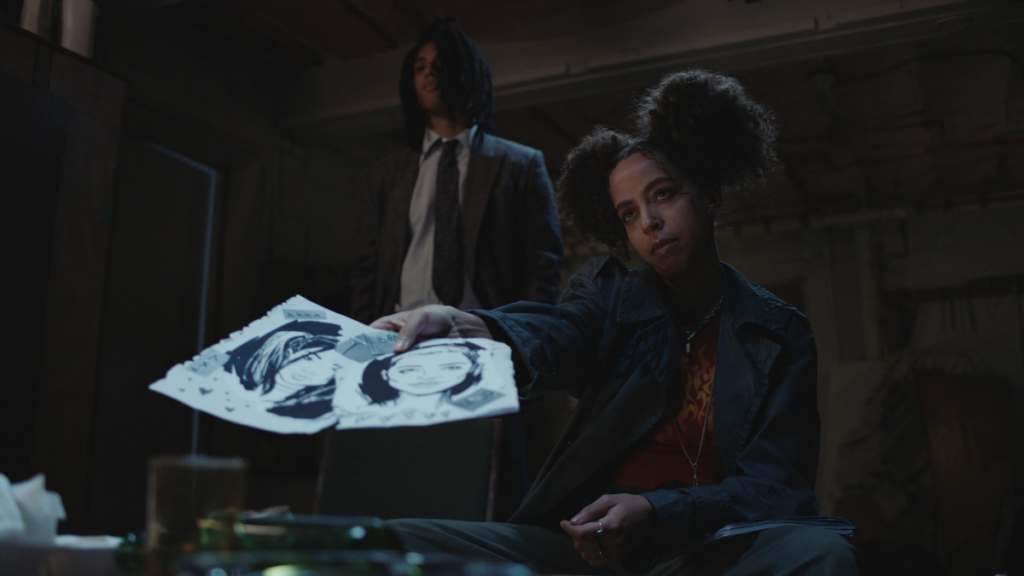Door Mouse will be available on Digital Download in the U.K. from July 10
Actor Avan Jogia was about six years into his acting career when he made his first move directing shortfilms. Having acted in a number of projects since then, he wouldn’t really pop up on my radar until he was cast in 2019’s Zombieland: Double Tap alongside the likes of Woody Harrelson, Jesse Eisenberg and Emma Stone. I don’t quite know how anyone else would gauge this sort of progression, but I give Jogia credit for sticking to his trajectory as a creative on both sides of the lens.
Jogia’s latest work now comes to the masses with the commercial release of his feature debut, Door Mouse. The team is joined in part by lead actress Hayley Law who first emerged in my view in season one of Netflix series Altered Carbon, and also serves as one of the film’s associate producers. Law leads the charge from a script by Jogia who also co-stars alongside actors Keith Powers, Famke Janssen, Gabriel Carter, Donal Logue, Michela Cannon and Nhi Do.
Toned with punk allure and comic book vigor anchoring the film’s vigilante crime noir allure and subversive messaging, Door Mouse sets the stage as we meet Law in the role of Mouse. She spends her afternoons waking up from daysleeping, fueling herself with a cigarette and lousy coffee, and toils away at her original horror porn comics which she tries (and fails) to pitch to her local comic book retailer who, despite turning her down, still sees her potential. When she’s not piddling away with markers on her different grades of paper on which she tries to figure out the world through her art, she’s a burlesque performer at Mama’s, run by Mama (Janssen), and lowly-paid as are her colleagues, namely including Riz (Cannon), and the recently-missing Doe-Eyes (Do).
From the top of Door Mouse, the sudden disappearance of Doe-Eyes is what sets the story in motion with Mouse and dashing fellow confidant, Ugly (Powers), pounding the pavement to investigate her whereabouts. Their inquiry soon leads Mouse to drug pushing ex-boyfriend Moony (Jogia) only to end up back at square one when suddenly, the two show up at the club and learn that Riz was violently taken by men in suits. It’s an unfortunate break in a harrowing case that finds Mouse and Ugly venturing interdependently into the city’s dangerous underbelly, bringing them face to face with some of the city-scummiest and most sniveling and criminal in both extremes of the economic classes.
The biggest development occurs after a tragic discovery results in Mouse coming the closest she’s ever been in her maverick investigation into an elite cabal of masquerade sex enslavers with ties to the city’s politically and financially powerful and corrupt – businessmen, judges, you name it. What unfolds is the harrowing start to a fight that brings Mouse face to face with a certain evil, and in Mouse’s sardonic and near-fatalist worldview and approach to life, friendships and relationships alike, a chance to become the kind of hero her story needs.
One particular caveat to this is that Mouse’s actions also serve as the kind of inspiration folks find in comic books. Obviously that’s not her goal, but it serves adjacently to the ends of a film like Door Mouse in which our protagonist, at least initially, is hardly someone you would see any real traits in a hero. For that matter, it also makes her evolution all the more fascinating. She’s someone nobody really sees coming, in a world where the powerful and arrogant expect all those in roles befitting of their places to stay accordingly.
One thing I found interesting is that the film is keen to iterate the mood in more focused moments placing the camera between Mouse and several key characters warning her about her lines of questioning. It’s not a necessary tool, but a fun little story ornament to keep viewers guessing about who’s who, what, where and why. Another is that the film is written with Mouse narrating the events in the past tense, which adds to the intensity of seeing how the story plays out and knowing that at some point, characters are going to die, coupled with moments where Mouse finds herself crippled with ominous feelings and dreadful thoughts.
Mouse’s guarded psyche notwithstanding, her cordiality with Ugly (Powers) is about the closest she has to something she cares about that isn’t directly hers. That his character is named Ugly, despite all dashing good looks and reputable demeanor as a stand-up guy to the contrary, sort of feels indicative toward a greater analysis at play, especially in the doom and gloom of Mouse’s world and during the course of events. Pair this with the fact that she often advises him to go home or tries to make him deviate from her choices, and you almost get a sense of what the stakes are for Mouse apart from any wistfulness she quietly endures. Still, at times theirs is a courtship you’re hoping to see manifest, even though inevitability hints at prospects far more different and perhaps bittersweet. It’s an aspect of Door Mouse that culminates with the film’s formula, in accordance with the singular development of Mouse’s character, and the (albiet mostly subdued) emotional journey she faces.
While the movie moves at a slow pace at times, its energy is more gradual thanks to its performances and chemistry between characters. Law showcases strength and resilience in a worthwhile heroine whose controlled vulnerability amid her self-discovery is her north star in her tenacious quest for justice. Crafted with twisty intrigue, whirlwind energy and a sense of omniscent awarness, Door Mouse bustles as a titllating and robust crime thriller, as it does a poetic essay about finding beauty in the world’s parasitic ugliness, and fighting to preserve it in hopes of making the world just a little more livable.

